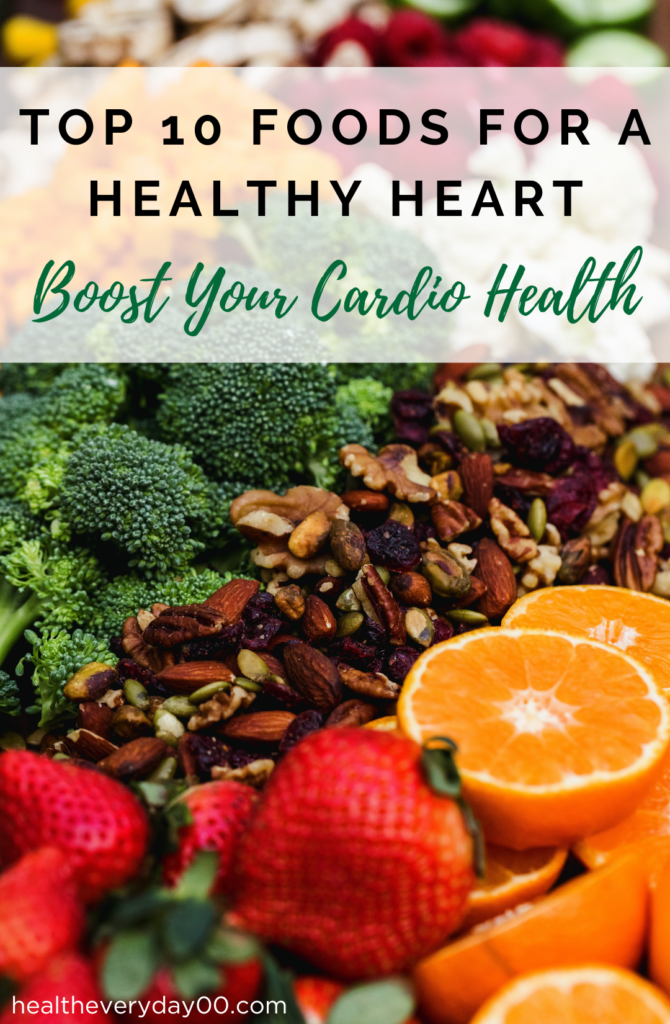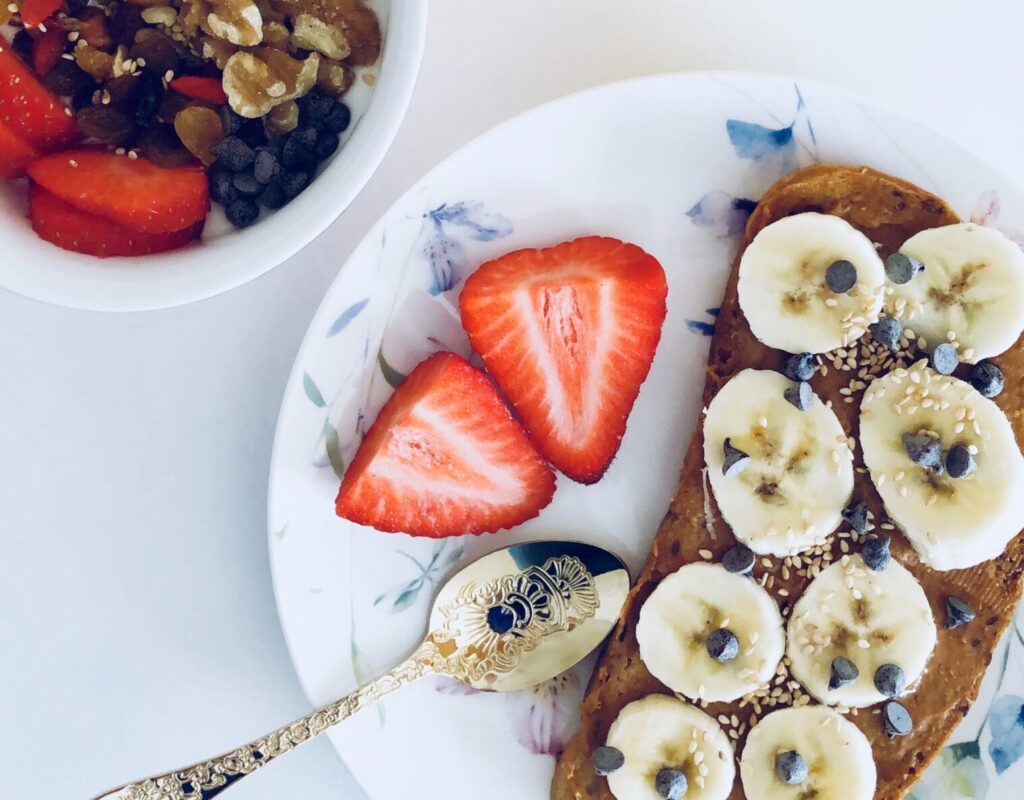Top 10 Foods for a Healthy Heart: Boost Your Cardio Health

Introduction
A robust and healthy heart serves as the epicenter of our overall well-being, underlining the significance of nourishing it with the right foods. The journey toward optimal cardiovascular health is paved with a fundamental understanding of heart-healthy foods and their pivotal role in maintaining our bodies. With a conscious focus on specific nutrients, like Omega-3 fatty acids and antioxidants, we can make informed dietary choices that contribute significantly to the health of our most vital organ.
Recognizing the importance of a healthy heart extends beyond mere awareness—it’s a proactive step toward a vibrant and resilient life. Exploring the world of heart-healthy foods unveils a spectrum of nutrients that not only support but actively fortify the cardiovascular system. Join us on this insightful exploration of not just what to eat but how these foods benefit the heart, demystifying myths and making practical recommendations to integrate these nutritional powerhouses into daily life.
Understanding Heart-Healthy Foods
Eating for heart health means focusing on specific nutrients that support the cardiovascular system. Essential nutrients like Omega-3 fatty acids and antioxidants play a crucial role in maintaining a healthy heart.
Essential Nutrients for Cardiovascular Health
Omega-3 Fatty Acids
Omega-3 fatty acids, predominantly found in fatty fish like salmon, mackerel, and sardines, are essential for reducing inflammation and supporting heart health. These healthy fats aid in reducing the risk of heart disease and stroke. Additionally, sources such as flaxseeds, chia seeds, and walnuts offer plant-based options rich in these beneficial fatty acids.
Omega-3 fatty acids contribute to reducing triglycerides, lowering blood pressure, and preventing plaque buildup in arteries. This nutrient also aids in maintaining healthy heart rhythms and reducing the likelihood of arrhythmias.
Antioxidants
Antioxidants are composites set up in a variety of foods, particularly generous in berries, dark leafy flora, and vibrant fruits. These composites are vital for combating oxidative stress in the body, guarding the heart from damage caused by free revolutionaries. Berries similar as blueberries, strawberries, and snorts, along with vegetables like spinach and kale, are excellent sources of these heart-defensive nutrients. Antioxidants help help the oxidation of LDL cholesterol, thereby reducing the threat of atherosclerosis. They also prop in relaxing blood vessels, which in turn helps lower blood pressure, promoting better cardiovascular function.
Top 10 Heart-Friendly Foods
1. Dark Leafy Greens
Dark leafy greens like spinach, kale, and Swiss chard are powerhouses of vitamins, minerals, and antioxidants. They are rich in vitamin K, essential for proper blood clotting, and also contain high levels of dietary nitrates, which support lower blood pressure. Incorporating them into salads, smoothies, or sautés can easily enhance your daily meals.
2. Fatty Fish
Fatty fish such as salmon, mackerel, and trout are abundant sources of Omega-3 fatty acids, known for their role in reducing inflammation and promoting heart health. Consuming these fish at least twice a week is recommended to benefit from their heart-protective properties.
3. Berries
Berries like blueberries, strawberries, and raspberries are packed with antioxidants, flavonoids, and soluble fibre, making them excellent choices for heart health. Whether added to breakfast bowls, yogurt, or enjoyed as a snack, these vibrant fruits offer a sweet and nutritious way to boost heart health.
4. Nuts and Seeds
Nuts like almonds, walnuts, and seeds such as chia and flaxseeds are loaded with heart-healthy nutrients like Omega-3 fatty acids, fibre, and unsaturated fats. They make for convenient and nutritious snacks that support heart health when consumed in moderation.
5. Whole Grains
Whole grains like oats, quinoa, and brown rice are rich in fibre and essential nutrients. Their consumption aids in reducing cholesterol levels and maintaining overall heart health. Incorporating them into your diet through breakfast cereals, side dishes, or baked goods is a smart choice for a healthy heart.
6. Avocado
Avocados are dense in heart-healthy monounsaturated fats and potassium. These creamy fruits can be added to salads, used as a spread, or blended into smoothies, providing a delectable way to support heart health.
7. Olive Oil
Olive oil, especially extra-virgin olive oil, contains monounsaturated fats and antioxidants. Its use in cooking, dressings, or drizzled over meals can benefit heart health and reduce the risk of heart disease.
8. Legumes
Legumes like beans, lentils, and chickpeas are excellent sources of plant-based protein, fibre, and essential nutrients. These versatile foods can be incorporated into soups, stews, salads, and dips, offering a heart-healthy addition to your diet.
9. Tomatoes
Tomatoes contain lycopene, a powerful antioxidant that aids in reducing the risk of heart disease and stroke. Whether consumed raw in salads, as part of sauces, or in soups, they are a versatile and heart-healthy addition to meals.
10. Dark Chocolate
Dark chocolate, with high cocoa content, contains flavonoids that benefit heart health. Consumed in moderation, it can aid in reducing blood pressure and improving blood flow.
Integrating Heart-Healthy Foods into Your Diet
Incorporating heart-healthy foods into your daily diet can be achieved through various mealtime strategies.
In Breakfast:
Add berries or nuts to your morning cereal or oatmeal.
Use whole-grain bread for toast or sandwiches.
Blend avocados into smoothies or incorporate them into breakfast bowls.
In Lunch:
Prepare salads with a variety of dark leafy greens, tomatoes, and beans.
Use olive oil-based dressings for added heart-healthy benefits.
Opt for whole-grain wraps or sandwiches filled with avocado and lean proteins.
In Dinner:
Include fatty fish as a main protein at least twice a week.
Cook with olive oil in place of saturated fats.
Incorporate a side of legumes or whole grains in meals for added fibre and nutrients.
As Snacks:
Snack on a handful of nuts or seeds for a quick heart-healthy boost.
Enjoy berries or sliced avocado as a nutritious snack between meals.
Dark chocolate in moderation can be a delightful and heart-healthy treat.
Creating Heart-Healthy Recipes:
Experiment with heart-healthy ingredients in various recipes.
Explore online resources or cookbooks for heart-friendly meal ideas.
Substitute unhealthy ingredients with heart-healthy alternatives in your favorite dishes.
Myth-busting about Heart-Healthy Eating
Myth: All Fats Are Bad for the Heart
Reality: Not all fats are created equal. While saturated and trans fats are detrimental to heart health, unsaturated fats, such as those found in nuts, seeds, avocados, and olive oil, are beneficial. These healthier fats can improve cholesterol levels, reducing the risk of heart disease.
Understanding the difference between healthy and unhealthy fats is crucial. Moderation and choosing the right types of fats can support heart health.
Myth: Healthy Food is Expensive
Reality: While some organic or specialty health foods might be pricey, many heart-healthy options are affordable. Items like whole grains, legumes, and seasonal fruits and vegetables can be budget-friendly. With smart planning and strategic shopping, it’s possible to maintain a heart-healthy diet without breaking the bank.
Creating a balanced meal plan that includes cost-effective heart-healthy foods is key. Making use of frozen or canned varieties of fruits and vegetables and buying in bulk can be budget-friendly options.
Myth: Eating Healthy Means Bland Food
Reality: Healthy eating does not equate to bland or tasteless meals. In fact, heart-healthy foods can be incredibly flavorful and enjoyable. Using herbs, spices, and various cooking methods can add depth and richness to dishes without compromising on health. Experimenting with different recipes and culinary techniques can make healthy eating a delicious and satisfying experience.
By exploring diverse cuisines and cooking styles, it’s possible to create exciting, delicious, and heart-healthy meals. Cooking with fresh ingredients and adding layers of flavors can make every meal appetizing.
Myth: Avoiding all Carbohydrates Is Essential for a Healthy Heart
Reality: Not all carbohydrates are harmful. Whole grains, fruits, and vegetables are rich in essential nutrients, fiber, and antioxidants, providing significant benefits for heart health. It’s refined carbohydrates and added sugars that can be harmful. Moderation and choosing whole, unprocessed carbohydrates are essential for a balanced diet.
Balancing the consumption of carbohydrates by focusing on whole grains, legumes, and high-fiber foods is essential. These carbs can support heart health while providing sustained energy and essential nutrients.
Myth: Healthy Eating Requires Drastic Changes Overnight
Reality: Making small, gradual changes to your diet can have a substantial impact on heart health. Quick and drastic changes can be difficult to sustain. It’s more effective to start with manageable adjustments, gradually incorporating more heart-healthy foods over time. Setting realistic goals and taking incremental steps can lead to long-term success.
Making gradual changes and setting achievable goals can ensure lasting improvements in heart health. Slowly replacing unhealthy options with heart-healthy alternatives can lead to significant positive changes.
Addressing these misconceptions and debunking the myths surrounding heart-healthy eating can pave the way for informed choices and sustainable dietary changes that support overall cardiovascular well-being.
Conclusion
In the realm of heart-healthy living, the choices we make extend far beyond the kitchen table. Our hearts, the engines of our vitality, are well-deserving of the best care we can provide. By embracing heart-healthy foods that nourish and protect this crucial organ, we take a profound step towards prioritizing our well-being. Through this culinary journey, we’ve uncovered the hidden potential within our everyday meals, debunked myths, and empowered ourselves to make informed and sustainable dietary decisions.
Remember, the path to a healthier heart isn’t merely a diet but a lifestyle. By incorporating these heart-friendly options into our daily routines, we invest in our long-term health. Together, let’s celebrate the joy of flavorful, nourishing meals while nurturing our hearts and embracing the transformative power of conscious eating for a life brimming with vitality and well-being.



